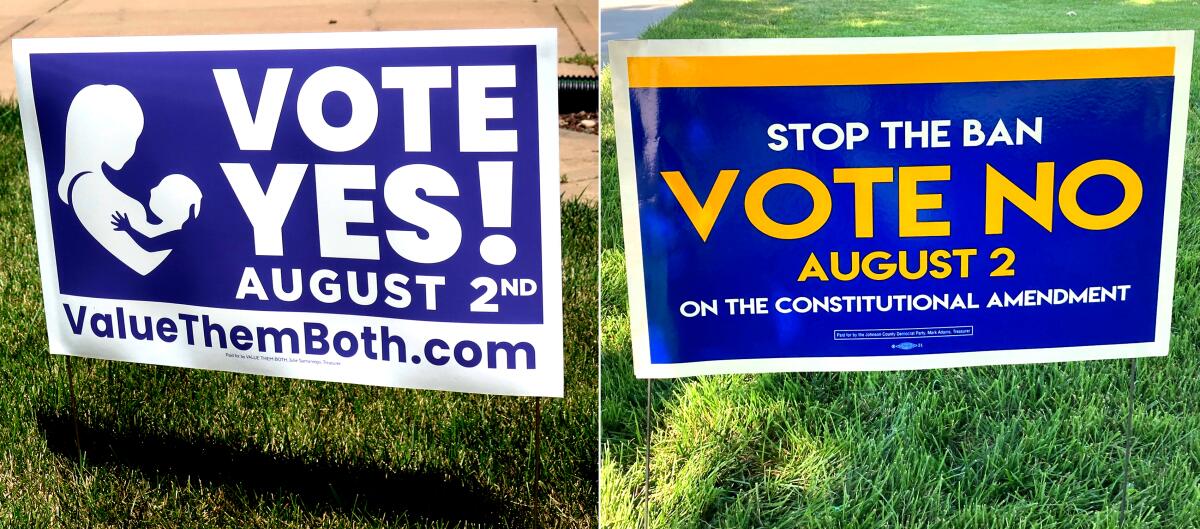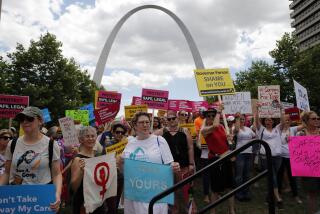Op-Ed: Kansas’ abortion amendment invites legal chaos

Kansas, deeply red Kansas, is set to vote Tuesday on whether to protect or deny abortion rights. More than a year ago, the supermajority Republican Legislature proposed a misleadingly titled and confusingly worded amendment to the Kansas Constitution — the “Value Them Both” amendment — which if passed will have the effect of overruling a 2019 Kansas Supreme Court decision that held the Kansas Constitution recognizes the right for a woman to seek an abortion in the state and subjects legislation regulating or restricting that right to “strict scrutiny,” one of the highest judicial standards in constitutional law.
Yet the proponents of the amendment purposely and misleadingly chose to title it “Value Them Both” as though it somehow protects both women’s rights and fetuses. The wording of the amendment is so vague and unclear that I have had many fellow Kansans ask me what it means and what legal effect a vote of “yes” or “no” will have.
Beyond making it confusing, the proponents scheduled the vote for a primary election more than a year after the amendment was proposed, not a general election. Why? In Kansas the Republican bench is deep, and we often have contested primary elections, as we do this year in the race for attorney general. But not so in the statewide races with Democratic candidates. Everyone knows more Republicans than Democrats will vote in primaries.
I have seen a lot of elections in Kansas but none quite like this one. For the past few weeks, I and many Kansans have received more mail about the proposed constitutional amendment than about any candidate. Daily I receive glossy brochures urging me to vote “yes,” or sometimes to vote “no.”
As former solicitor general of Kansas who worked with five Kansas attorneys general of both parties, I know well how organized and active the abortion opponents in Kansas are, and how politically influential they are. They are present in the statehouse every session, they follow litigation to the point of attending every court proceeding, and they make their presence, viewpoints and political influence known. But there generally is no such counter-presence and organization by the many Kansans who favor women’s reproductive rights.
I have never seen anything like when I went to vote in advance last week in Lawrence. I parked at the polling place in the middle of a Wednesday afternoon and found it buzzing with activity. There were two dozen or more people voting, in line to vote, coming and going — all a week before election day. It seems the people of Kansas are engaged.
I have been doing many media interviews recently about this election, both local and national, and have given much thought to what this all means for Kansas and perhaps the nation. As a former law clerk to two U.S. Supreme Court justices, and the law clerk who wrote the “pool memo” to the justices in the Casey vs. Planned Parenthood case in the fall of 1991, I interpreted the recent Dobbs opinion much like so many others. The court’s rationale that the Constitution has nothing to say about abortion and that this divisive issue should be left to the states and their democratic processes has, I suppose, in some abstract sense, an intellectual appeal.
But I believe that notion is completely unrealistic. The democratic process works when people are rational, will discuss and debate issues, consider each other’s viewpoints, and are willing to compromise and work together for the greater good. That simply does not and will not happen when it comes to abortion, because one side admits no compromise.
I grew up in Russell County, Kan., the home of one of my heroes, the late Sen. Bob Dole, known for his willingness and ability to reach across the aisle and achieve goals that bettered the nation as a whole. In contrast, the camp opposing abortion admits of no exceptions, no compromise, no mercy.
How can the democratic process function if a complete ban on abortion is the only goal? Ridiculously, last week the Kansas attorney general felt compelled to issue a legal opinion that saving a woman’s life by dealing with an ectopic pregnancy did not “count” as an “abortion” under Kansas law. Really? Is that even a legal question? If so, what if the Kansas Legislature disagrees? That “clarification” cleared up nothing.
The compromise America needs was a constitutional one, as Justices Anthony M. Kennedy, Sandra Day O’Connor and David Souter wisely recognized — it was the Casey decision, which enshrined in constitutional law a regime of compromise, one that permitted bans on late-term abortions (with exceptions to save the life and preserve the health of women) while generally protecting the right to early-term abortions and allowing medically reasonable regulations prior to fetal viability.
The nation’s highest court got it right in that ruling 30 years ago, and the top court in Kansas was correct three years ago in recognizing a right to abortion under the Kansas Constitution, even if it adopted a higher standard than federal law at the time.
I hope enough good Kansans do the right thing on Tuesday, voting “no” on an amendment that will lead to no compromise in Kansas and the loss of constitutionally protected rights.
Stephen R. McAllister is a professor at the University of Kansas School of Law.
More to Read
A cure for the common opinion
Get thought-provoking perspectives with our weekly newsletter.
You may occasionally receive promotional content from the Los Angeles Times.










